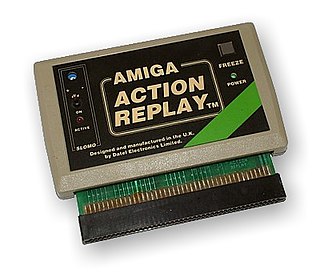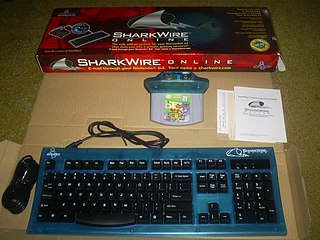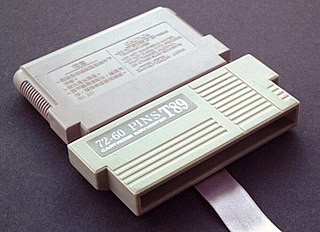 W
WAction Replay is the brand name of a cheating device created by Datel. The Action Replay is available for many gaming systems including the Nintendo DS, Nintendo DSi, Nintendo 3DS, PlayStation Portable, PlayStation 2, GameCube, Game Boy Advance, and the Xbox.
 W
WThe Aladdin Deck Enhancer is a system-enhancing adaptor to use Compact Cartridges on the Nintendo Entertainment System. It was produced by Camerica and developed by Codemasters but not licensed by Nintendo. It is similar to the Datach system for the Famicom, but without the Barcode feature. It was released in November 1992, with its planned library to reach a total 24 games by the end of 1993. However, only seven games were actually released.
 W
WThe CD64 is a game backup device made by UFO/Success Company for the Nintendo 64 that allows users to run ROM files off a CD-ROM attached to the system. Similar to the Doctor V64 and the Z64 units for the N64, it is most commonly used for playing backups of Nintendo 64 games. Since it has a built-in communications port that is accessible from the N64 program, it can also be used as a rather versatile development/debug device.
 W
WThe Doctor V64 is a development and backup device made by Bung Enterprises Ltd that is used in conjunction with the Nintendo 64. The Doctor V64 also had the ability to play Video CDs, audio CDs and had an option for applying stereo 3D effects to the audio.
 W
WA game backup device, formerly usually called a copier and more recently a flash cartridge, is a device for backing up ROM information from a video game cartridge to a computer file called a ROM image and playing them back on the real hardware. Recently flash cartridges, especially on the Game Boy Advance and Nintendo DS platforms, only support the latter function; they cannot be used for backing up ROM data. Game backup devices also make it possible to develop homebrew software on video game systems. Game backup devices differ from modchips in that modchips are used in conjunction with systems that use generally available media such as CDs and DVDs, whereas game backup devices are used with systems that use cartridges.
GameShark is the brand name of a line of video game cheat cartridges and other products for a variety of console video game systems and Windows-based computers. Currently, the brand name is owned by Mad Catz, which marketed GameShark products for the Sony PlayStation, Xbox, and Nintendo game consoles. Players load cheat codes from GameShark discs or cartridges onto the console's internal or external memory, so that when the game is loaded, the selected cheats can be applied.
 W
WThe Mr. Backup Z64 is a game backup device designed by Harrison Electronics, Inc., able to store Nintendo 64 games as ROM images on Zip Diskettes. Units such as this can make copies of a game which can be played in a Nintendo 64 emulator.
 W
WThe R4 is a series of flash cartridges for the Nintendo DS handheld system. It allows ROMs and homebrew to be booted on the Nintendo DS handheld system from a microSD card. This allows the user to run homebrew applications, to store multiple games on a single memory card, and to play games that have been backed up by the user.
 W
WSharkWire Online is a specialized GameShark device with a serial port and modem added, accompanied by a now-defunct dialup Internet portal service. Launched in January 2000, it was sold only in the US, by InterAct which is most famous for its GameShark and Dexdrive. This unlicensed platform was the only Nintendo 64 online service to have been released other than Nintendo's official Randnet service which had already been released only in Japan in December 1999.
 W
WThe Super 8, also sold under the title Tri-star or Tristar, is an unlicensed video game peripheral released in 1995 for the Super Nintendo Entertainment System designed to allow the system to run games developed for the Nintendo Entertainment System. The Super 8 utilized an NES-on-a-chip integrated circuit to duplicate the functionality of the original NES hardware, and connected to the SNES's own cartridge slot.
 W
WThe T89 cartridge converter is a 60 to 72 pin adapter that allows NES owners to plug a 60-pin Famicom game into a 72-pin-based NES. The cartridge required the user to have the Famicom cartridge label facing the back as otherwise it would cause damage to the cart and/or system. There is a fabric tab on the converter to allow the easy removal of the device from the original front-loading NES and its subsequent top loader revision.
 W
WWii Freeloader is a bootdisc developed by Datel to circumvent regional lockout on the Wii video game console. It allows the playing of games from other regions, but does not allow the use of DVD±R, commonly used for backups, copies or homebrew. It can be used in combination with a modchip to allow compatibility with more games or to use an update blocker. The user enters the bootdisc into the Wii system, launches the application from the Wii Menu, then replaces the disc with a region-locked game disc. This disc allows the user to play foreign GameCube games, but there have been some issues reported with different signals and the games simply not working on a foreign system, even with use of the Wii Freeloader.